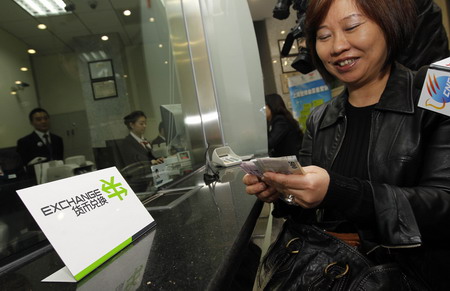Money
Mainland-Taiwan banking sector to open further
By LI XIANG (China Daily)
Updated: 2010-06-30 10:36
 |
Large Medium Small |

|
 |
|
A businesswoman from Taiwan gets new Taiwan dollar exchanges from a bank in Shanghai. [Pei Xin / Xinhua] |
Historic trade agreement to allow cross-Straits financial freedoms
BEIJING - Mainland and Taiwan financial institutions are expected to accelerate their expansion into the lucrative cross-Straits market after the two sides signed a historic trade agreement on Tuesday that promises to open each other's financial industries.
The banking sectors will be among the first to benefit from the Economic Cooperation Framework Agreement (ECFA), which removed many of the last barriers in financial industries across the Taiwan Straits.
Under the agreement, Taiwan banks will be allowed to conduct business in the yuan currency once they establish a branch on the mainland for one year.
They can also apply to offer yuan loans to mainland-based Taiwanese companies if the bank branches are profitable after the first year of operation.
Similarly, mainland banks will be able to convert their representative offices in Taiwan into branches after a year of operation. Banks on both sides can also tap into each other's markets by buying stakes in each other's financial institutions.
Industry watchers said the trade deal opens up the mainland's massive market for Taiwan banks, which are struggling on the island in a crowded market for financial services.
| ||||
"The mainland's huge market means that Taiwan banks could gain new clients and do business in the local currency," Fang said. "They would be very happy to see the opening up of the banking sector on the mainland where the gap between lending and deposit interest rates is among the largest in the world."
ECFA will also help boost the development of mainland-based Taiwanese companies that are usually small- and medium-sized enterprises and are in dire need of capital, Fang added.
Authorities have approved four Taiwan banks, including the Land Bank of Taiwan and Taiwan Cooperative Bank, to set up branches on the mainland.
In the meantime, the trade agreement also eliminates obstacles for securities brokerages, futures firms and insurance companies doing business in the cross-Straits market.
More financial information, such as the listings of exchange-traded funds and the deposit receipts of listed companies, will be available for investors on both sides, with the financial markets gradually opening up, said Lai Haifeng, an analyst at Guoyuan Securities in Shanghai.
"The opening of the capital markets across the Straits will allow investors in Taiwan to trade in the A-share," he said. "Similarly, more capital from the mainland will flow into the Taiwan market as well."
Taiwan's stocks rose on Tuesday to a three-week high upon investors' expectations that the signing of the ECFA between the island and the mainland will help boost trade worth about $110 billion a year.



